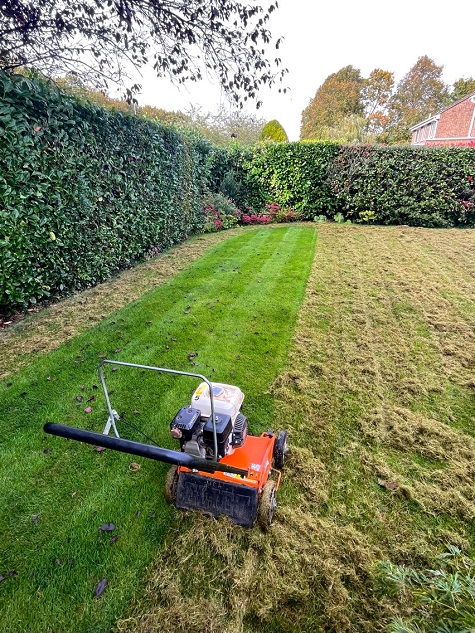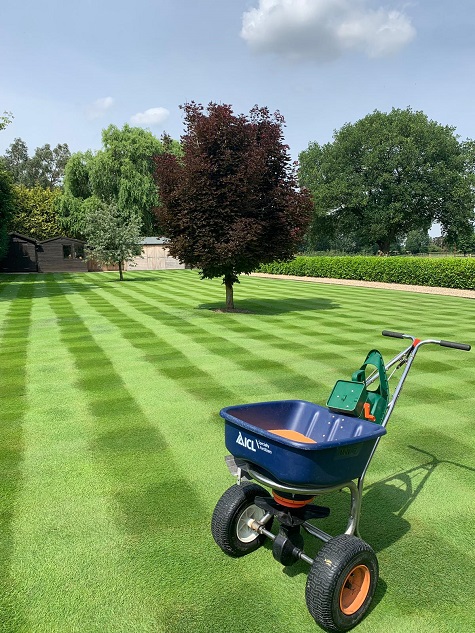

In 2023, I wrote a series of monthly articles, and their key purpose was to help all readers increase their understanding of sustainability, learn from the experiences of others and help them deliver sustainable practice in their own organisations and operations. In this new series, I am taking the opportunity each month to look in more depth at individual organisations. How are they seeking to be more sustainable and, importantly, how are they seeking to advise and support members or customers? This month we focus on the UK Lawn Care Association (UKLCA), an important organisation in terms of supporting operators and businesses in this growing sector.
The lawn care sector, comprising those businesses supporting households across the UK, is large and growing. A survey was undertaken by the Amenity Forum in 2020 to establish an estimate of the size of this sector. The figures emerging estimated that, at that time, around 15 million people in Great Britain employed professionals to help in the maintenance of their lawns. In such projections, lawn care services were defined as having a core activity of providing fertiliser and weed care but with add on services including advice. The estimates did not include those organisations providing a lawn cutting service. Other key facts were a spend of at least £54 million on lawn fertilisers alone in a year and an estimated area of professionally managed lawn in GB of 10000 hectares.
PROMOTING SUSTAINABLE PRACTICE
Whilst the survey has not been updated, there is clear evidence that the sector continues to grow and develop its offer. Operating organisations are either franchise businesses, with two currently dominating, or independents, largely focussed upon specific local areas. Many of these now belong to the UK Lawn Care Association (UKLCA). As their website states ‘’this is a voluntary association created by independent UK lawn care operators who are committed to providing the best quality and highest level of lawn care service at homes across the UK. Their members, many of which are local independent businesses, are able to enjoy the support of industry leading manufacturers, benefitting from learnings and networking opportunities of likeminded business’’. The association invests in training events, health and safety and best practice initiatives aiming to bring to their members, and their customers, the latest turf care knowledge and practices.

Promoting sustainable practice and helping their members to implement methods to be more sustainable are key priorities for UKLCA. As an example, they hold an annual conference and the 2024 event held in January included key-note presentations relating to sustainability. These even included one by the author of this article! UKLCA also issue related guidance notes and newsletters. They are an active member of the Amenity Forum and strong advocates for best practice as well as promoting the UK Amenity Standard and encouraging all of its members to operate at this level and proudly display the logo. In its own operation and administration, it seeks wherever possible to hold online meetings and minimise waste, being very strongly digital in its activities.
PRACTICAL MEASURES
So how are its members responding to the agenda of sustainability at a practical level. Some examples are as follows:
The delivery of services to individual households requires travel by the operator to each home, normally by van. Many businesses are looking to move to electric power although such a change is not as easy as it may at first seem. As Tom Arnold from TopGrass points out, not all their operators return to base at the end of each day and so, if their van is electric, it can involve charging at their homes. This is not always feasible. Also, for bigger vans, the extra weight involved can be a factor. As often emphasised in these articles, sustainability comprises three main pillars, each of which is important to determining best sustainable practice. The pillars are economic, environment and social related. Moving to electric vans is not always able to be defined as the most sustainable based on these three pillars in this sector, certainly at present. However, technology continues to develop and the trend to electric, and indeed hydrogen in future, will continue, linked to government targets. The UKLCA see it is as an important role to keep their members fully updated on such developments.
The UKLCA is also keen to message the public on issues relating to sustainable practice. Lawns can be good carbon sinks, when managed properly, and with appropriate planting of surrounding bedding, can combine to help reduce emissions, create zero carbon solutions and encourage biodiversity. Indeed, John Draper from Greener Gardens reports that a number of his clients are creating specific wildlife areas in their gardens, aiming to reduce emissions whilst still having the green well-cut lawn they see as important. What a large number of UKLCA member organisations employ are systems to assist better logistical planning; optimising routes and seeking to minimise travel by clear route planning. Also, within the sector, tracking software is used providing reports for drivers seeking to create safer approaches and more sustainable practice. Members are putting ever greater emphasis on recycling and reducing plastic use.
SLOW RELEASE FERTILISERS
In terms of their core activities, key developments have included ever greater use of slow-release fertilisers and using organic products where appropriate and possible. One member reports that they are now exclusively using stabilised nitrogen products, again aimed at better utilisation and slower, more effective release of added nutrient. Most organisations put emphasis on advice to customers on lawn care with reports provided after each visit. This seeks to ensure customers undertake practices to optimise use of inputs applied and reduce waste. Spot spraying of herbicides is now standard practice for most, and encouraging the use of environmentally friendly products wherever possible.
The launch of a new authorised pesticide to combat the damage caused through leatherjackets and chafers has been widely welcomed and will be used but it will be linked with advice to customers on cultural ways of reducing incidence of the pests, such as, importantly, less thatch. The use of nematodes is complex and unlikely to be universally feasible given the small scale of most lawns but is available through many operators if requested. Leather jacket and chafer damage has been a key cause of concern for residents, not able to understand why immediate treatment has not been possible.
ADDING TO SERVICES
Increasingly members are adding to their services. Mention has already been made of advice to householders and other such additions include the use of soil improvers, again seeking to optimise productivity from within rather than through added nutrients. Use of water retention products and clearer advice on watering of lawns are also important. Many businesses now enter into annual contracts linked to monthly payments by house holders. This is an agreement to provide an optimum service, not necessarily based on a specific number of visits or prescribed actions, but visits where appropriate and to meet needs and requirements depending upon conditions. Some businesses now also can provide a fertiliser service for plant beds bordering lawns and one talked to now provides wildflower seeds and planning to help owners produce beds both aesthetically pleasing as well as encouraging biodiversity and wildlife.

TRAINING & UPDATING
UKLCA puts great emphasis on helping sign post its members to training and updating as well as providing its own continuing professional development (CPD) activities. A major reason for lawn care businesses being members of UKLCA is the access to information and CPD. However, it is interesting that a recent survey of customers by one of the larger independent lawn care businesses indicated that, although of course homeowners wanted to be more sustainable, key to them still was a green well maintained lawn. One other question also posed was if they did not use chemical control would they be prepared to accept weeds in their lawn. Over 95% said, in this case, they preferred, for now, using chemicals and high control – interesting and highlighting the challenge of marrying public stated views on sustainability with what it impacts directly upon them.
CONCLUDING THOUGHTS
UKLCA were keen to emphasise that the association invests significantly in training events, both physical and on-line, emphasising health and safety and best practice initiatives. To independent members they seek to provide an affordable opportunity to invest in their business and staff ensuring they stay ahead of the latest knowledge and practices.
Lawncare is big business directly engaged with the public in all its operations. It has a key role in promoting and implementing sustainable practice and helping achieve zero carbon goals and more integrated approaches. Yet in all of this, its customer demand a first-class lawn and marrying the two is not without challenge. My discussions with UKLCA convince me that the sector is taking matters very seriously, as ever interesting and challenging times but never short of opportunity.
Next month’s article will focus on the training and qualification sector and specifically the work of Lantra in helping sector deliver sustainable practice.
Previous articles in this series